- Home
- Nancy Means Wright
Poison Apples Page 8
Poison Apples Read online
Page 8
Emily liked that in a man. She wondered if Adam would—but that was looking too far ahead. And Emily was still going out—more or less—with Wilder. But Wilder was away at that fancy school now. She wondered who he was dating down there.
She tossed a handful of pebbles at Adam’s window and he grinned out at her. “C’mon in,” he called, and she entered, although she felt a little embarrassed at the thought of the Butterfields in there, too, who might still be in bed. But they weren’t there at all. Their bunk beds were neatly made up. Adam was sitting on his unmade bed, pulling on his jeans, like he’d just woken up. His chest was bare, and not hairy at all—unlike Wilder, who had a thick nest of brown hairs on his neck and breast.
“I’m so-oo sleepy,” he said. “I had a nightmare last night— couldn’t sleep. That old one I told you about. My mother’s putting a rope around her neck, only it was me this time, my rope, my neck....”
He looked so woeful, so stabbed in the very heart, like Hamlet after his dear father’s death, that she didn’t resist when he suddenly pulled her down beside him on the narrow bed. Any minute, she felt, any minute he’d start to weep, and then she would comfort him, in any way she could.
“Comfort me with apples,” he said, and buried his head in her breasts.
Chapter Twenty
It was a beautiful late afternoon, leaves spinning gold on the poplar trees, Queen Anne’s lace and wild purple aster carpeting the pastures; and Ruth was out in the middle of it all, getting ready to bring in the cows. But Emily still hadn’t come home to grain and prep them. She was apple picking, yes, but she’d promised to be home for chores. Tim had Sunday off and Ruth was alone with the thirty-odd cows. She was trying to get the herd back up to forty as it had been when Pete left, though she might have to sell the two calves born last week. One of them was Bathsheba’s calf, dropped out in the burdocks. Bathsheba was one of the wild ones, second only to Zeida: No one was going to tell her what to do! Only last spring she had leaped over a pair of barbed-wire fences and taken to the road. Three months pregnant, she trotted down Cow Hill Road, forded the Otter Creek, and crossed a trafficky Route 23 before Ruth and Tim could find her and bring her home. Pregnancy kept her quiet awhile, but she ignored the calf after it was born, and Jane Eyre had to play surrogate mother. Ruth should sell the cow, but couldn’t bring herself to.
Moving up beside her now was Moll Flanders, another problem cow. She thought Ruth was her mother. Ruth would sit by her in the barn and she’d lay her head in Ruth’s lap. Even now, as Ruth walked back, Moll was shoving her big black head under Ruth’s arm. Ruth didn’t mind, really, it was a sign of affection; she needed affection these days. Emily was ready to move out into the world, Vic, in middle school, was impatient of any company but his peers, and Sharon was wholly absorbed in motherhood. As for Colm—well, too much attention there. He’d read a Dorothy L. Sayers mystery novel, and, like her Lord Peter Wimsy, had begun proposing to Ruth once a week. She couldn’t accept, of course, not yet. She’d grown used to her freedom, too, hadn’t she? Did she ever want to marry again?
Colm wasn’t discouraged, though; Wimsey did finally get the girl. But Ruth wasn’t going to conform to some woman in a mystery novel. Oh no.
Free of Moll, she shooed the cows into the barn, got the first four ready for milking. Just as she was about to disinfect the teats, Emily ran into the barn, breathless. “I went [gasp] for a ride [gasp] with [gasp] Adam. We had a flat tire, Mom, on Snake Mountain Road [gasp]. Adam didn’t have a jack, we had to hike to somebody’s house.”
“Yes,” Ruth said, not wanting to hear the tale. She was tired, her back was aching; she needed help, not excuses. “You can tell me later. Prep those cows, will you? Then we’ll milk. The cows won’t wait. Molly’s getting antsy.”
She knew she should listen now. But she was everybody’s mother here: not just to Emily, but to three dozen cows and calves! Seeing Emily’s lips tighten, she relented. If Emily couldn’t confide in her, what crazy thing might the girl do? She thought of the Rowan boy whose parents had deserted him for work and religion.
“I’m sorry, Em. I really want to hear all about it. At supper, okay? I’ve made a meat loaf.”
“Meat loaf again?” said Emily, sounding world-weary, and Ruth sighed, turned back to the cows. Immediately, of course, the barn phone rang, and mechanically she picked it up. “Hello?” she said, hearing her own voice hard, and then harder still when she heard who it was. “Pete? What do you want, Pete?”
It was Pete who should be here milking these cows; angry tears squeezed out of her eyes. “What are you into now, Pete? You’re a developer, are you? Buying up people’s dreams? They’ve had problems at that orchard, Pete, they’re good people. They’re trying to make a go of it.”
“Wait a minute, wait,” he said, sounding laid back as always, making her seem the shrew. “I’ll explain.”
She heard him clear his throat, heard the change jingle in his pocket. She remembered that about him: He always cleared his throat when he was nervous, jingled the change in his pocket. Good. She’d wait it out. Why was she still bitter? She’d have to get over it. She should accept separations, accept divorce. “This is the twentieth century, Mother,” her daughter Sharon would remind her. “Divorcees are civilized to each other.” Yet when she saw Pete, heard his voice, the old shock of his leaving welled back up in her.
Finally Pete said, “This woman, she’s a friend of Violet’s.” (Violet, oh yes, that was the woman’s name—she kept forgetting it.) “She ... I...” He was confused now; she relished it. “She knew I farmed for a time.”
“A time? Twenty-two years,” she said.
Ignoring the comment, he went on. “I, um, know the area. I said I’d help out. The friend is from downstate New York. Trying to get back to the land, you know, has some capital.”
Back to the land all right, she thought, and waited again.
“Well, that’s it. I’m helping out a little.”
“You’re a partner.”
“Well, that was her idea.”
“You told her to go to that orchard. You knew they had some, well, problems?”
“I did read about the spraying last spring. I get the local paper, like to know what’s going on.” He chuckled. “I am a native here,” he reminded her. “My parents and grand-parents are—”
“Buried here, yes.”
She heard him pull in a breath. “I think I’ve explained,” he said stiffly. “And it wasn’t just because they’ve had ‘problems.’ We— she—has called on other orchards and farms.”
“Not this farm, Pete. I don’t want her coming around here.”
Now it was his turn to be silent. Then, “The land’s half mine, I believe. Last I knew. Are you planning to buy me out?”
“You know I can’t. Not yet.”
“You could get married. That whazzisname, the mortician.”
“You know perfectly well what his name is. You were in high school together. Colm Hanna.”
He laughed. “My memory’s slipping. I’ve been away, you know.”
“I know. Where are you calling from, anyway?”
“Branbury Inn. I’m up for a few days. That’s why I called, before you decided to give me the third degree. I want to take Vic and Emily to Montreal, a little outing. Violet and I....”
She felt a chill wind blow through the open barn door. Beyond, the early evening mountains were an icy blue. It was mid-September, winter was breathing in on them already. “You’ll have to ask them. Emily?” she called, and the girl came running.
“Dad,” she said eagerly, and Ruth went back to the cows. The hum of the milking machine, the grunting and salivating cows, drowned out Emily’s voice. When Ruth straightened, ready for the next group of cows, Emily was back. “I’ll take over, Mom.”
“Are you going, then? To Montreal with your father?”
“I’d like to, I really would. But I have the apple picking. And next Sunday morning Adam and I are renting a can
oe. We’re paddling down Otter Creek, having breakfast at Mister Ups.”
Emily sounded happy. She pushed her mother aside. “Go in and check that meat loaf, Mom. I’m fine.” And Ruth did just that.
But when she opened up the oven, the meat loaf was burned. It was that damned electric stove Pete had bought before he took off. It overheated, it burned everything. What was wrong with the old gas stove? At least she could count on it.
She decided to call Colm. She needed to talk to a friend. Colm was in real estate; she’d ask him to look into this developer. Only she’d forgotten the woman’s name. So she called Moira Earthrowl. And Moira said she’d call back, the woman’s name was on a card somewhere and she couldn’t look that minute. “Things are a madhouse here. The goat’s gone! It happened while the Jamaicans were picking. Someone cut the rope. The Jamaicans are all in a tizzy. And I’m darned if I want to go get another goat!”
Ruth called Colm anyway. But he wasn’t home, he wasn’t in his real estate office, and he wasn’t at the police station. Wholly frustrated now—was there no one to talk to in this town?—she dropped the phone into its cradle, and poured herself a tall mug of Otter Creek Ale.
Chapter Twenty-one
Moira calmed the Jamaicans with a promise to get another goat. More or less calmed them, that is. They were accusing one another of letting the animal go. Derek was pointing a finger at Zayon, the goat “keeper.” “He let ’im go, yeh, he wanns see um run, he let um go.” And Zayon: “I neber let um go, you know dat. Why I do anyways? You crazy, mon. Someone cut um loose, de rope cut, right?” He held up an end that was still attached to a tree in front of the bunkhouse, shook it under Derek’s nose. Bartholomew laughed, and Zayon turned on him. “Laugh, laugh, mon, go ’head. I tink you de one cut ’im loose. To spite me. Make me look bad.” He made a movement toward Bartholomew and the old man jumped back, responded in the patois. “Hey! You watchit dere. I do nutting of de kind, you know dat.”
“Stop it, stop it now,” Moira shouted, and Derek sidled up to her. “Jus’ an ole hate,” he confided in her ear, “ober a woman. Bartolomew he took away Zayon woman, ten year ago, but Zayon he don’t forget it. Neba mind now, bosslady. I calm he down.” He took Zayon’s arm and led him back into the bunkhouse, although the latter was still muttering, “Trick, trick, dey play on me trick.”
So she’d have to get another goat. She made Bartholomew promise not to mention that the rope was cut. She’d told Stan that the goat broke away, and he’d accepted that with a shrug. He didn’t need anything more now on his plate. She was worried sick about him, to tell the truth. He was obsessed with all that had happened: the spraying—though it could have been an error; the maggots and worms—though she argued they might have come from another orchard; the felled trees—well, where was the explanation for those? A disgruntled picker? Surely not the Jamaicans, whose livelihood depended on the work. If not—then who? Rufus Barrow, who obviously wanted the orchard for himself? The local pickers, those cheerful young people? she couldn’t imagine it. The Three Partners, who wanted the orchard sold? That Messengers minister, who resented Stan’s interference with Cassandra—and the woman dead and Stan accused of running her down? Not true! Not her Stan!
Though he had changed over the last three years, she had to admit that. He was like her bootlace, fraying more and more until just this morning, it broke. It could have been Stan who ran down the woman, she had to face the possibility. Her body trembled with the thought. But no, surely not deliberately. The Stan she’d married twenty-six years ago would never kill, not in his right mind. Not that Stan. But this new Stan?
Think positive, she told herself. He didn’t do it. He didn’t kill that woman. No.
“Well, Opal,” she said—the girl was on the porch, tuning up her guitar; it was like a fingernail running over a blackboard— “looks like the goat is just plain gone. We’ll have to get another. You want to come with me?”
Opal looked at her blankly. “Goat?” And went on tuning. Zing zing zong zung...
“You didn’t hear all the whooping and hollering? Someone cut the rope and the goat’s gone. They searched all over last night but couldn’t find it. So we’ll have to get another. You want to come with me?”
The girl’s frown gave her the answer. She sighed, pulled on a jacket; she’d go alone. But before she could reach the door, the phone rang. It was old Glenna Flint from the Flint farm on the road behind the orchard. A goat on a raveled piece of rope had blundered into Glenna’s pasture and got caught on a fence. “We’ve got enough trouble with a greyhound dog and a pain-in-the-ass rented cow,” Glenna said. “We don’t need a goddamn goat! I been calling around. I want somebody to come and pick it up. Now.”
Moira whooped. They’d come at once, she promised. “Don’t let it get loose! It belongs to our Jamaicans. We’ll send over a bowl of goat soup for your trouble.”
“Don’t trouble yourself,” said Glenna, who was known for her outspokenness, and hung up.
“We’ve found the goat,” Moira told Stan, who was coming through the door, with a Cortland apple in each hand.
“This,” he said, holding them out, “is what that worm does.” She saw where the flesh was undermined, bruised and brown.
“How awful. But we were warned when we bought the place. You have to worry about weather and worms and maggots and—”
“People,” he said. “People who have an axe to grind. And grind it on us. That goat didn’t break away, the rope was strong. Zayon told me that; I believe him. Someone deliberately cut that rope. It’s one more link in a chain of malice.”
He sank down in a chair, dropped the apples—he was dropping things a lot lately, she’d noticed—and Moira picked them up, sat on the chair arm beside him. He didn’t look at all well: His skin was as bruised-looking as the apple where the worm had burrowed. The worm that was burrowing into their lives, eating away at their hearts, their marriage.
She stroked his hair. “Stan, Stan, sweetheart,” she said. “We’ll fight it. Ruth and her friend Colm Hanna are helping—Colm works part-time for the police—”
“No police!” he said. “No reporters!”
“No, no. It’ll be like having a private detective. They’ll keep our troubles as quiet as they can. Things will come right, you’ll see.” He closed his eyes then, while she stroked and murmured, and moments later he was sound asleep in the wing chair.
Chapter Twenty-two
When Emily arrived at the orchard after school, she found Derek crooning to the goat. “Ole billy goat,” he told her, “he heb hisself a good time ’fore he turn to soup.”
“Oh,” said Emily, “how could you do that anyway? To a poor goat? You’ve given him a name, right?”
“Who name him? Not me,” he said, winking at Desmond, who was emerging from the bunkhouse in his black rubber boots, the apple bucket strapped to his chest. He looked like he was ready to march off down the road, beating a drum.
“Well, I’ll name him, then,” she said, watching the goat nibble the grass, which was already considerably thinner in the area where he was tethered. “I’ll call him. . . Munchy. Munchy the goat. Hello, Munchy,” she said, and patted the goat on his hairy head. It felt surprisingly soft.
“We munch ’im, all right. At de harvest supper,” said Derek, guffawing, and Emily sighed. It was like the young bulls she and Vic would grow fond of at home, and suddenly the bull would be gone, and she knew where—to the slaughterhouse. Her mother was a softie, of course, she always managed to be in town when they came to take the male baby away.
“Don’t serve me any of your Munchy,” she said, making a face. Derek laughed, of course, and spotting Adam striding down the path, Emily ran off.
They were working in the southeast orchard today, Adam told her, he and Emily and Millie were picking together. The Butter-fields were in a different quad. “I need to talk to you. I have an idea,” he went on, and something leaped in her throat, like a bird wanting to get out and fly.
She waved at Rufus as he drove past. His tractor was pulling a small wagon filled with crates, into which they’d unload the picked apples. He looked straight ahead, granite-faced as usual. Adam stuck an elbow into her ribs, and she laughed. “I’ve tried telling the guy jokes,” he said, “and he just nods and grunts. I don’t think he knows how to smile.”
“Too bad,” she said. Nothing could break her good mood today. She’d gotten an A on an American history test—her teacher would recommend her for any college she wanted to go to, if she decided to go next year, and if she could get a full scholarship; the sun was out; and she was with Adam. Adam, who thought she was pretty—he’d told her that only yesterday.
“You’re a pretty girl,” he’d said. “You going to run that farm yourself one day?” And right then she decided that she wasn’t— though he meant it in a positive way. “I don’t intend to farm,” she’d said. “Mom says we can choose, Vic and me. We’re not committed. I mean, my dad has already quit the farm. He doesn’t want anything to do with cows.” Adam had smiled. He understood the lure of the city, he said.
“So what do you want to do with your life?” she asked him now, as she picked the lower branches of a Macintosh tree, taking care to ease the apple gently off the tree as Rufus had taught, and into her bucket. True, she thought, it wasn’t a day for thinking ahead; rather, for living the moment—as her sister Sharon was always repeating, although Sharon had two children now and had to live moment by moment, diaper by diaper. Emily didn’t think she wanted that life, either—at least, not for a long time.

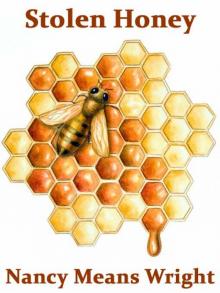 Stolen Honey
Stolen Honey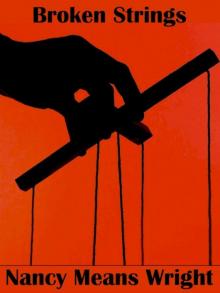 Broken Strings
Broken Strings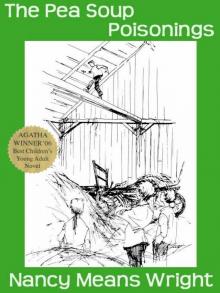 The Pea Soup Poisonings
The Pea Soup Poisonings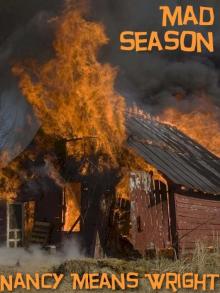 Mad Season
Mad Season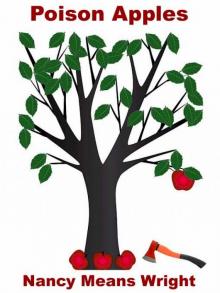 Poison Apples
Poison Apples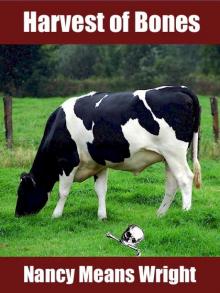 Harvest of Bones
Harvest of Bones